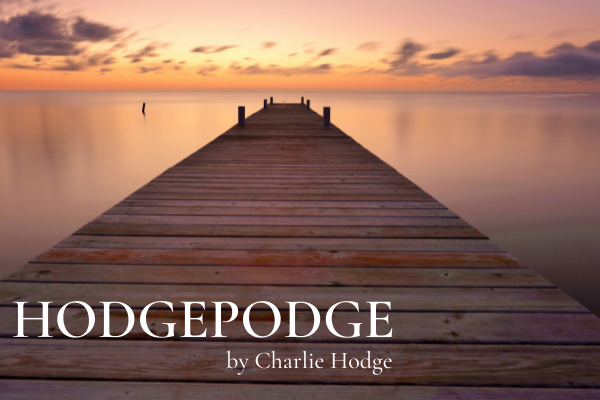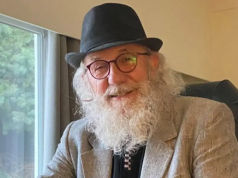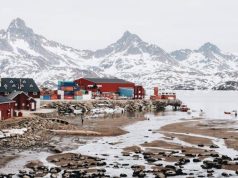Embracing a new year, a new lifestyle with creativity and relaxation
HodgePodge, by Charlie Hodge
I feel pensive about it all.
New Year’s Eve launching 2022 was one of the oddest New Year’s eves in history. Certainly it felt that way for me and a number of others in ‘my circle.’
Constant change is here to stay indeed – and it is unsettling, disturbing, confusing, aggravating and a tad terrifying.
Where is it all going?
How will the next year unfold?
In reflection of the past two or three years I’m tempted to ponder perhaps that Eyore was, in fact, an optimist. Or that Chicken Little was correct. Certainly its recently felt like the sky is falling.
During the previous 60 years or so, we’ve experienced numerous incidents of intense stress and worldly worries such as Vietnam war, the FLQ crisis, kidnappings, bombings, high school tragedies, nuclear strikes, terrorism, famine, economic collapses, environmental destruction … Yet each New Year was approached with a general desire to wish in a new year filled with great hope and improvements, while kicking the previous year into the corner. No matter what had transpired in the previous year – hope bubbled forth along with the popping corks of anticipated improvement.
Then COVID arrived and everything went into a spin.
We are still spinning.
Three years after its arrival there is a sobering recognition that our world of isolation, quarantines, face masks, immunization needles, social distancing and fear is not about to go away after a simple flip of one calendar day. This may indeed be the new norm.
Critical crisis is not uncommon for ‘modern’ man to deal with, however simultaneous devastation on such a world-wide collective manner is. The entire world has been thrown into total mayhem with various epidemics compounded by both environmental and social anarchy. As a planet will we adapt or die from our current global warming, COVID covered conflicts and chaos?
Tez and I spent New Year’s, like most Canadians, at home. Just the two of us, Netflix, and a house full of cats and Christmas decor. In reality, there’s a 90 percent chance we would have spent New Years’ Eve at home – regardless of the COVID factor, however that very real threat cinched the decision for us.
Slow and gentle is a lifestyle we both now prefer.
I am a hermit despite my public face – and always have been. I’ve been very fortunate in living a wonderful split personality life. Filled with the joys and pleasure of life and people in the ‘fast’ lane yet a quiet, tucked away life at home in my garden or canoe when ‘off duty.’ With work in journalism, the music industry, hockey, politics and the environment, I have had more than my fill of socializing and networking. While thriving on such stimulation and motivating stages I have also learned the ability to recharge in solitude.
The gardener, canoeist, poet loves the quiet hermitage.
For me, adapting to staying at home during pandemic outbreaks has been relatively easy. In fact enjoyed. Yet even I have found myself feeling frustrated and depressed by the continuance of COVID and spin-off or new killer strains of disease rocking the world.
The greatest danger to mankind, however, may not be the pandemics as it is how we, as individuals and nations adapt.
Or don’t.
While most folks agree that adhering to social distancing guidelines is the most effective way to eliminate the coronavirus many folks refuse to listen, still gather in groups, break guidelines, refuse vaccinations … Such choices are damaging friends and family relationships – creating even greater stress for all involved.
It’s frustrating and emotionally difficult if one of your immediate family members, co-workers or friends are ‘anti-vacer.’
How do you handle someone who is blatantly ignoring guidelines? How do you reason with someone who is, essentially, a COVID-19 denier?
There’s a psychological reason some people ignore social distancing or rebel on other ways. Jud Brewer, M.D., Ph.D. is a neuroscientist, addiction psychiatrist and director of research and innovations at the Mindfulness Center of Brown University says there are likely several reasons why people aren’t staying home right now.
“Some people are trying to retain a feeling of control by ignoring or defying stay-at-home orders. Other people are oppositional in nature and routinely defy authority. Many more are in denial, especially if they aren’t in hardest-hit areas, aren’t in high-risk groups and/or don’t know anyone with the virus.”
Brewer says anxiety “definitely” affects our ability to think clearly, make decisions or solve problems. Uncertainty can contribute to a denial of reality or factual information. When anxiety gets really bad, we start to panic. “It leads to things like panic-buying,” Brewer suggests.
One of the keys, I believe, is to pull back on stressing about what others are doing or not doing and simply do your best to monitor yourself. I’ve concluded we cannot control the actions of others, but we can heal ourselves. Reduce your own stress. If we can keep ourselves focused and positive we can grow the good. We collectively need to find ways to heal ourselves and those within our circle.
Accept the fact that our current lifestyle is the new norm and be prepared to adapt to it. Keep yourself busy at home. Learn to embrace your new lifestyle by working with it rather than against. Reshape your lifestyle and goals. Find projects and rituals to bring you comfort.
Many of your adaptations may simply be extensions of what you already do – cook, garden, exercise, clean. They are a stressless way to regain a sense of control. Start some hobbies, embrace change, be creative.
We have the ability to make our own change, not that of others. Look within and start there.
Happy New Year.





